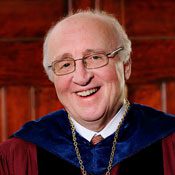 Many will glance at the cover of Called to the Life of the Mind: Some Advice for Evangelical Scholars by Richard J. Mouw and think, “Not for me…” Maybe so, but some will change their mind if they give it a taste. First of all, Dr. Mouw writes for people currently in graduate school or thinking about it. So if we know either a grad student or someone considering that route, here’s something that will put a warm glow in their stocking this Christmas. He’s concerned that people engaging academic work see it as, not only a serious, but the equivalent of monasticism, of taking a holy vow (without the celibacy). His concern rings true as can be verified on websites like Phinished.com where people in the middle of what Mouw writes about vent their fears and frustrations.
Many will glance at the cover of Called to the Life of the Mind: Some Advice for Evangelical Scholars by Richard J. Mouw and think, “Not for me…” Maybe so, but some will change their mind if they give it a taste. First of all, Dr. Mouw writes for people currently in graduate school or thinking about it. So if we know either a grad student or someone considering that route, here’s something that will put a warm glow in their stocking this Christmas. He’s concerned that people engaging academic work see it as, not only a serious, but the equivalent of monasticism, of taking a holy vow (without the celibacy). His concern rings true as can be verified on websites like Phinished.com where people in the middle of what Mouw writes about vent their fears and frustrations.
Mouw is a good guide here as he has taught at Calvin College and just stepped down as president of Fuller Theological Seminary, still remaining on the faculty. The book is very thin but do not mistake that thinness for being lightweight in content. Mouw writes in tight curves here. He doesn’t beat the air; he know what he’s talking about. And he shares freely as to how his own calling here fleshed out over the years, quoting not only from his own story but those of others making it a pithy little read.
 Mouw includes many nuggets of story and commentary that address a glaring weakness of the Christian faith in the West. We don’t think. And I don’t mean ladies mission circles conjugating Greek verbs. Or reading Charles Hodge’s systematic theology in the nursery. I mean that the doctrines of the Bible become a folder in our mental file, a card in our psychological Rolodex. When needed, we flip right to what we need; otherwise God’s truth lies dormant. We dip into the Bible for proof texts to back up what we want to believe whether it’s biblically accurate or not. We load up to fire salvos at Christians who disagree with us over when Jesus is coming, whether charismatic gifts ended with the apostles, the five points of Calvinism, creation issues, etc. or at atheists and other antagonists of the faith. It’s not that these things aren’t important. But we don’t always live Christianly while doing it. And who’s watching? Our children. Many young people drift away from their faith because they can’t find anything authentic in the faith expressions they were raised in. In the ‘60s, burned-out hippies and Buddhists made their way to Frances Schaeffer’s L’abri in Switzerland seeking Truth. Now dropouts from church youth groups go asking, “Is there anything to this? Is Jesus real?”
Mouw includes many nuggets of story and commentary that address a glaring weakness of the Christian faith in the West. We don’t think. And I don’t mean ladies mission circles conjugating Greek verbs. Or reading Charles Hodge’s systematic theology in the nursery. I mean that the doctrines of the Bible become a folder in our mental file, a card in our psychological Rolodex. When needed, we flip right to what we need; otherwise God’s truth lies dormant. We dip into the Bible for proof texts to back up what we want to believe whether it’s biblically accurate or not. We load up to fire salvos at Christians who disagree with us over when Jesus is coming, whether charismatic gifts ended with the apostles, the five points of Calvinism, creation issues, etc. or at atheists and other antagonists of the faith. It’s not that these things aren’t important. But we don’t always live Christianly while doing it. And who’s watching? Our children. Many young people drift away from their faith because they can’t find anything authentic in the faith expressions they were raised in. In the ‘60s, burned-out hippies and Buddhists made their way to Frances Schaeffer’s L’abri in Switzerland seeking Truth. Now dropouts from church youth groups go asking, “Is there anything to this? Is Jesus real?”
Others listening include real seekers and real critics. While many examining Christianity have intellectual questions, the trump card lies in the difference knowing Jesus makes in lives, in the street, in the marketplace of cities and of ideas. In Romans 12:2, Paul says, “Do not be conformed to this world, but be transformed by the renewing of your mind…”. Thinking kneads the biblical truth in our mental file folders deep into the fabric of the way I see my work, my marriage and parenting, how I manage my money and possessions, why I am here on this planet and a million other things. But when seekers and our critics, the secularists and/or atheists, don’t see this, we render Jesus tasteless in the eyes of people hungry for Him and give excuses to those looking to avoid Him. When people like Sam Harris characterize Christians and all religious people as stupid, all he has done is pull off the comments from his website. Stereotypes come from somewhere.
Serious working with the muscles of thought marks the spot where the Holy Spirit changes us (Romans 12:2). This is not just stuff for PhDs but must be for anyone who follows Christ. We actually become smarter. Carol Wimber, widow of John Wimber of what became the Vineyard Movement, recounts her memories of Gunner Payne, an oil rig worker who brought them to Christ and taught them the first steps. He invented many things including a floating electric power generator that worked off the wave action when tied to a pier. He was Beethoven with a wrench and welding torch. Carol said, “This man knew Jesus so of course he could do this sort of thing. It was our expectation that of course our bodies and brains would work altogether better now that we were with these people who knew Jesus. We expected creative thoughts to flow and would have been disappointed if our garden didn’t bloom more profusely than before.”
I can show you a Bible study where an IT guy, a car designer, an electrical equipment salesman, an accountant, a hairdresser, a mill worker or two, a school teacher and a mental health aide have discussions where the air crackles. One feels like their brain just had a vigorous shampoo after each session. One of the things that roped me into Jesus Christ was the sheer invigoration and pleasure of chewing on truth – of thinking. But a warning. Mouw cites a chapel service where Frank Gaebelein, a guest speaker, says about Christian scholarly work (and about Christian thinking in general), that Christians must know that “we must pay a price if we are to use our minds to glorify God. ‘And the price will not come down. It is nothing less that the discipline of self-restraint and plain hard work.” A quick look at best sellers making faith easier (or at least claiming to) explains why these words still stick.
Stuck for a last minute gift for the college or grad student in your life and don’t want to knee jerk to one of those big tins of popcorn? Mouw’s book is a winner. But don’t sell it short for a pastor or that person who just loves to talk theology but can’t find many takers. Christians who like to think can be an isolated crowd. But there’s always room for one more.
For more conversation on this book, visit the Book Club here:











